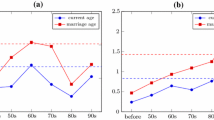Abstract
This article reviews the simple economics of matching by characteristics. The goal is to understand sorting patterns in the marriage market and other matching markets by focusing on the nature of the gain from match and the mechanism of the market force of competition.
Access this chapter
Tax calculation will be finalised at checkout
Purchases are for personal use only
Similar content being viewed by others
Bibliography
Becker, G. 1973. A theory of marriage: Part I. Journal of Political Economy 81: 813–846.
Damiano, E., and H. Li. 2007. Price discrimination and efficient matching. Economic Theory 30: 243–263.
Damiano, E., H. Li, and W. Suen. 2005. Unravelling of dynamic sorting. Review of Economic Studies 72: 1057–1076.
Koopmans, T.C., and M. Beckmann. 1957. Assignment problems and the location of economic activities. Econometrica 25: 53–76.
Kremer, M. 1993. The o-ring theory of economic development. Quarterly Journal of Economics 108: 551–575.
Kremer, M., and E. Maskin. 1996. Wage inequality and segregation by skill. Working Paper No. 5718. Cambridge, MA: NBER.
Legros, P., and A. Newman. 2002. Monotone matching in perfect and imperfect worlds. Review of Economic Studies 69: 925–942.
Li, H., and W. Suen. 2000. Risk-sharing, sorting, and early contracting. Journal of Political Economy 108: 1058–1091.
Milgrom, P., and J. Roberts. 1990. Rationalizability, learning and equilibrium in games with strategic complementarities. Econometrica 45: 101–114.
Roth, A., and X. Xing. 1994. Jumping the gun: Imperfections and institutions related to the timing of market transactions. American Economic Review 84: 992–1044.
Sattinger, M. 1980. Capital and the distribution of labor earnings. Amsterdam: North-Holland.
Shapley, L., and M. Shubik. 1972. The assignment game I: The core. International Journal of Games Theory 1: 111–130.
Shimer, R., and L. Smith. 2000. Assortative matching and search. Econometrica 68: 343–369.
Topkis, D. 1998. Supermodularity and complementarity. Princeton: Princeton University Press.
Vives, X. 1990. Nash equilibrium with strategic complementarities. Journal of Mathematical Economics 19: 305–321.
Author information
Authors and Affiliations
Editor information
Copyright information
© 2018 Macmillan Publishers Ltd.
About this entry
Cite this entry
Hao, L. (2018). Assortative Matching. In: The New Palgrave Dictionary of Economics. Palgrave Macmillan, London. https://doi.org/10.1057/978-1-349-95189-5_2481
Download citation
DOI: https://doi.org/10.1057/978-1-349-95189-5_2481
Published:
Publisher Name: Palgrave Macmillan, London
Print ISBN: 978-1-349-95188-8
Online ISBN: 978-1-349-95189-5
eBook Packages: Economics and FinanceReference Module Humanities and Social SciencesReference Module Business, Economics and Social Sciences




